Engaged Anthropology Grant: Caitlin E. Fouratt
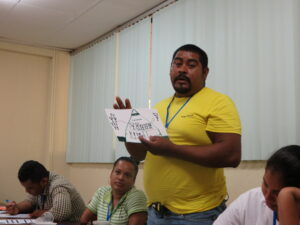
Caitlin E. Fouratt is Assistant Professor in the International Studies Program at California State University, Long Beach.
In 2011, while a doctoral candidate at the University of California, Irvine, she received a Wenner-Gren Dissertation Fieldwork Grant to aid research on “Presences and Absences: Nicaraguan Migration to Costa Rica and Transnational Families.” In June 2015, she returned for one month to Costa Rica and Nicaragua with a Wenner-Gren Engaged Anthropology Grant to teach a seminar on Migration, Family, and Policies at the University of Costa Rica and to facilitate two community workshops. The seminar included presentations on her own research as well as current research from local colleagues and students’ research projects. The first workshop, with Nicaraguan migrants in Costa Rica, focused on the challenges of family separation, gender and migration, and strengthening family ties. The second, with relatives of migrants back in Nicaragua, examined shifts in Costa Rican immigration law that migrants face and the complexity of transnational family relationships.
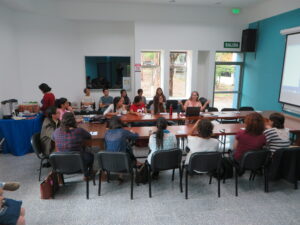
My dissertation research focused on the experiences of Nicaraguan migrants in Costa Rica and their families back in Nicaragua. Nicaraguans represent the largest immigrant group in Costa Rica and make up almost 8% of the population. In my research, I looked at the ways in which members of transnational families navigate the shifting meanings of family when faced with the challenges of migration. Two of the biggest challenges Nicaraguan transnational families face are the result of state policies on either side of the border. In Nicaragua, where decades of conflict, natural disasters, and economic crisis have deepened poverty, the government has been unable or unwilling to provide basic social services for much of the population. Most poor Nicaraguans seek to provide care for themselves and each other through family networks. But with high unemployment and low wages, families are forced to make difficult decisions, including deciding to migrate internationally to provide for food, housing, education, and healthcare for loved ones. Unlike in the rest of Central America, most Nicaraguans travel not north to the U.S., but south to neighboring Costa Rica, where wages are relatively higher, the journey takes less than one day, and immigration enforcement has not been as repressive as in the United States. However, this situation has been changing over the past ten years. Indeed, my research showed that, like other receiving countries around the world, Costa Rica is moving toward immigration policies focused on increasing restrictions for entry and residency and ramping up enforcement efforts and the costs of fees and fines. All of this affects families’ abilities to maintain relationships across borders.
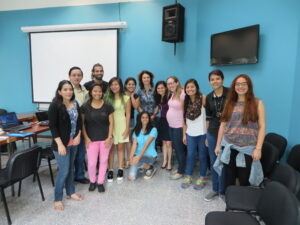
I applied for a Wenner-Gren Engaged Anthropology grant because I wanted to facilitate dialogue with Costa Rican colleagues working on migration and to share my results with the families who participated in the project. As a bonus, I was able to return with my now 3 year old daughter who was born in Costa Rica during dissertation research. During my dissertation fieldwork, my husband, Chris, and our daughter were my constant fieldwork companions for the 18 months we spent in Costa Rica and Nicaragua. Like many scholars of transnational migration, at various moments throughout my fieldwork, I found myself tracing and retracing the paths and journeys migrants themselves traveled. Becoming a mother while in the field, became integral not only to building rapport with my Nicaraguan interlocutors but also to my expectations of how I would undertake fieldwork and my understandings of kinship and family. Returning as a family allowed us to reconnect with the families with whom we spent so much time during her infancy.
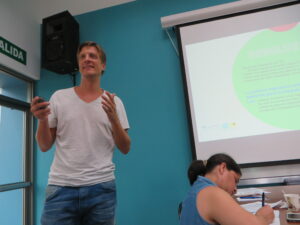
With the help of very supportive colleagues at the Instituto de Investigaciones Sociales at the University of Costa Rica, especially Koen Voorend and the Institute’s director, Dr. Carmen Caamano, I organized a 4 session seminar on Migration, Family, and Policies. We invited students, faculty, and community members to come together to talk about pressing migration issues in Costa Rica as well as global trends in migration and recent migration studies research. Because we wanted the seminar to create a space of dialogue rather than just a class about my research, we invited participants to share their own research, experience, and projects on the key themes of the seminar. As the first day of the seminar approached, I felt increasingly nervous. Other than in an article, I had never articulated my research in Spanish before, especially before a live audience. Plus, it was the end of the academic term and students and professors were preparing for exams. Would anyone even attend? I needn’t have worried. Our first meeting included 26 undergraduate and graduate students, faculty and researchers, NGO members, and even some Nicaraguan migrants who had participated in my research.
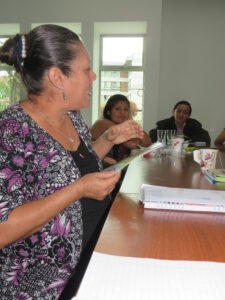
It was exciting to present my work to Costa Rican colleagues and receive their feedback. But even more rewarding was to hear colleagues and students present on their recent work. Koen Voorend presented on the relationship between Nicaraguans’ legal status and use of social services in Costa Rica. Dr. Carmen Caamaño, the director of the IIS presented on her work with migrant organizations, and Olinda Bravo, the coordinator of the Network of Women Migrants, on the network’s experiences standing up for labor rights and advocating for immigrants in Costa Rica. Students also presented their thesis projects, which ranged from work in psychology on the mental health of Central American refugees in Costa Rica, from Social Work in gendered aspects of border crossings, and to a Fulbright scholar home on vacation about unaccompanied child migrants in the U.S. What impressed me most was the level of interest that these issues sparked among students and faculty. As one colleague noted, years ago when she completed her masters at the University of Costa Rica, she was almost the only student working on migration. Now, there are students across disciplines and levels interested in issues of migration and gender, mobility, family, and law. The dialogue sparked by planning and facilitating the seminar has already prompted plans for joint publication with Costa Rican colleagues and I hope will set the stage for future collaborations.
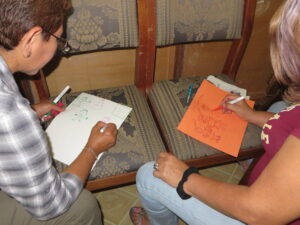
In between seminar sessions, I also organized two workshops, one in Costa Rica and one in Nicaragua with former research participants and members of transnational families. These workshops would have been impossible to organize without the help of the very dedicated staff of ASTRADOMES, the Association of Domestic Workers, and the Network of Women Relatives of Nicaraguan Migrants. These women supported and encouraged me during fieldwork years ago, and were key to handling all the logistics and organizing needed to pull off the workshops successfully. The first workshop, in Costa Rica, was hosted by ASTRADOMES, and included 15 migrant women, who trekked through a torrential downpour to attend. We started the day introducing ourselves by drawing our families, then I presented some key insights from my research, particularly on the gendered work of maintaining family ties, and received lots of audience input and commentary. We closed by brainstorming some strategies that migrants could use to strengthen transnational family relationships.
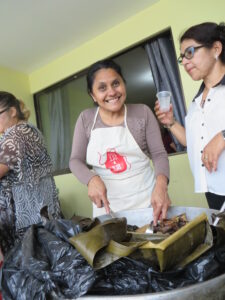
In Nicaragua, our workshop was cut short by the celebration of the Repliegue de Masaya, a reenactment of a battle leading up to the anniversary of the Sandinista Revolution. But again, the coordinators of the Network of Women Family Members of Migrants and Astradomes ensured that we would have a great turn out. Although I had hoped to give a more formal academic talk before the workshop, the schedule changes meant few faculty could make it and workshop participants needed to arrive early to avoid public transit delays. In the end, I presented on Costa Rican immigration law and the lived experiences of “illegal” migrants to the workshop participants themselves. Afterwards, many participants noted that this was a topic they rarely discussed with their family members in Costa Rica, though many of them were undocumented. The presentation offered a new perspective on the challenges their loved ones faced abroad. But what made this part a highlight was that several professors from the Universidad Centroamericana (UCA) attended and expressed interest in collaborating with the Network and Astradomes. These faculty members were key contacts that the network had been trying to connect with and build relationships with for a long time. I hope that the conversations started here will lead to more fruitful collaborations not only for myself, but for Astradomes and the network.
The conversations sparked in these activities have not only helped me think through my research in light of participants’ comments, suggestions, and critiques, and to brainstorm future avenues of research, but have prompted conversations among academic and community-based colleagues about continuing to develop spaces for collaboration and feedback.